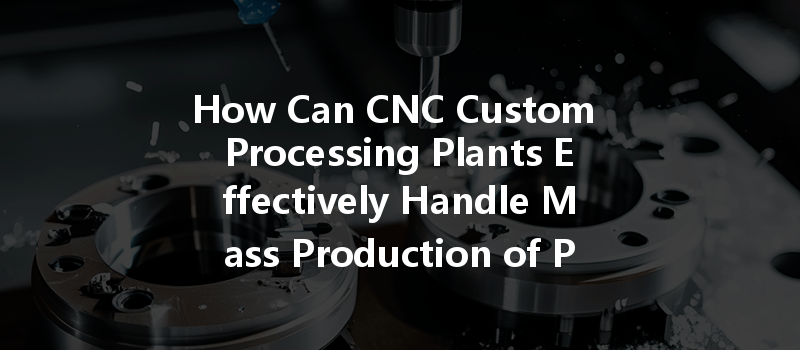Opening: Did you know that the global CNC machining market is expected to reach a staggering $117 billion by 2026? With the soaring demand for precision parts across various industries—from aerospace to consumer electronics—companies are increasingly turning to CNC (Computer Numerical Control) custom processing plants to fulfill their mass production needs. But can these plants genuinely handle the rigorous requirements of mass production while maintaining the high standards of precision and quality that customers demand? Let’s explore the methods, technologies, and strategies that empower CNC processing plants to navigate these challenges.
Understanding CNC Custom Processing
CNC custom processing involves using computer-controlled machines to create parts and components from various materials such as metals, plastics, and composites. The technology has revolutionized manufacturing by enabling high levels of precision, adaptability, efficiency, and repeatability.
However, the specific demands of mass production—where the goal is to produce large quantities of identical parts with minimal variance—present unique challenges. These include maintaining precision, optimizing production speed, managing costs, and ensuring quality control.
1.1 The Importance of Precision
Precision is paramount in CNC machining. In mass production, even the slightest deviation can lead to significant issues, resulting in costly rework or damage to brand reputation. The tolerances required for precision parts can be as tight as ±0.005mm in some industries.
1.2 Advanced Tooling
To achieve this level of precision, CNC custom processing plants invest in advanced tooling technologies. High-quality cutting tools, such as carbide and ceramic options, enhance productivity while ensuring the sharpness necessary for precision cutting. Moreover, the implementation of advanced tool management systems helps monitor tool wear and replace tools proactively, thus maintaining machining integrity.
1.3 Adaptive Machining
Another technology contributing to precision in CNC mass production is adaptive machining. Utilizing real-time feedback from sensors and probes integrated into CNC machines, manufacturers can adjust machining parameters dynamically as they observe the cutting process. This minimizes errors in machining and maintains accuracy throughout production runs.
2.1 Lean Manufacturing Principles
One successful approach for CNC plants to tackle mass production efficiency is implementing lean manufacturing principles. By minimizing waste—whether it’s time, materials, or labor—plants can enhance productivity. Techniques such as Just-in-Time (JIT) inventory practices can ensure that materials arrive as needed, reducing storage costs and waste.
2.2 Automation and Robotics
Automation plays a vital role in optimizing workflows in CNC custom processing. Robotic arms and automated workstations can handle tasks such as component loading, unloading, and inspection. This not only speeds up the production process but also minimizes human error and labor costs.
2.3 Scheduling and Capacity Planning
Proper scheduling and capacity planning are essential to ensure CNC resources are optimally utilized. Software solutions can help forecast demand and schedule machines accordingly. By leveraging machine learning algorithms, these systems can optimize production schedules, improving turnaround times while reducing downtime.
3.1 Real-Time Inspection
Quality control is a critical aspect of CNC mass production. Implementing real-time inspection techniques, such as optical and laser scanning, allows manufacturers to detect defects during the production process. This leads to early intervention and can drastically reduce scrap rates.

3.2 Statistical Process Control (SPC)
Statistical process control (SPC) is another method that can be employed to maintain quality throughout mass production. By continuously monitoring the production process using statistical methods and tools, CNC plants can ensure that processes stay within defined quality limits, allowing for immediate corrective actions as soon as deviations are detected.
3.3 Certification and Compliance
Furthermore, maintaining stringent compliance with industry certifications such as ISO 9001 ensures that CNC processing plants adhere to high-quality standards consistently. This is especially crucial for sectors like aerospace and medical, where precision and safety are non-negotiable.
4.1 Understanding Material Characteristics
The choice of material directly affects the accuracy and quality of the final product. CNC plants must understand the mechanical properties, thermal behaviors, and machinability of different materials to optimize machining strategies accordingly.
4.2 Material Optimization Techniques
To further enhance production efficiency and ensure quality, CNC custom processing plants increasingly adopt material optimization techniques. Techniques such as computer-aided design (CAD) and computer-aided manufacturing (CAM) software can simulate the machining process, enabling engineers to identify the best material usage patterns and minimize waste.
4.3 Supply Chain Management
Establishing strong relationships with reliable suppliers is crucial. CNC plants should aim to build a responsive supply chain that can provide high-quality materials in the required quantities. Incorporating technology such as inventory management software can also assist in tracking material costs and availability in real-time.
5.1 Reducing Operational Costs
Operational costs can quickly escalate if not managed effectively. CNC custom processing plants can reduce costs by optimizing machine usage, minimizing power consumption through energy efficiency techniques, and adopting preventative maintenance strategies to lower downtime.
5.2 Value Engineering
Value engineering is a systematic method to improve product value by reducing cost while enhancing performance. By analyzing every component, CNC plants can find alternatives that maintain product integrity while decreasing production costs.
5.3 Understanding Job Pricing
Another essential aspect is accurately pricing jobs. Understanding production costs—including material costs, labor, machine time, and overhead—enables CNC custom processing plants to provide competitive quotes while ensuring profitability.
In conclusion, handling mass production of precision parts in CNC custom processing plants is a multidimensional challenge that requires an integrative approach leveraging advanced technologies, efficient workflows, stringent quality control, and robust material management. By implementing precision engineering techniques, adopting automation and lean manufacturing principles, and optimizing quality control measures, CNC manufacturers can efficiently produce high-quality parts while effectively managing costs.
Ultimately, to remain competitive and responsive to the evolving demands of industries, CNC custom processing plants must continuously iterate on these strategies and technologies. The landscape of manufacturing is ever-changing, and as we move forward, the importance of precision and efficiency will only grow. This blog underscores the critical factors and solutions involved in CNC machining, serving as a reminder of the ingenuity and innovation that propels modern manufacturing forward—ensuring that CNC custom processing stays at the forefront of mass production capabilities.






